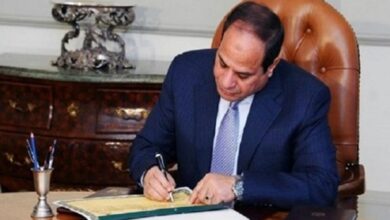The Egyptian opposition coalition met Wednesday to discuss whether they will boycott October’s parliamentary elections if the government does not provide legal guarantees for a free and fair vote.
Representatives from the liberal Wafd, the leftist Tagamu, the pan-Arab Nasserist, and the Democratic Front parties refrained from clearly suggesting that they will not field candidates to the parliamentary elections, a call put forward by reform movements such as that of former IAEA head Mohamed ElBaradei.
Instead, the four secular parties, widely thought of as lacking a strong grassroots base, compiled a list of conditions. If the conditions are not met by the government, each party will decide on its own whether or not to participate in the elections.
“The coalition parties decided that they will seek specific guarantees of transparent elections from the government. Should the government not provide these guarantees, each party will decide what to do,” said Mounir Fakhry Abdel Nour, the general secretary of the Wafd party, pointing out that boycotting remains an alternative if the government fails to respond to their demands.
These guarantees include that all stages of the elections process be monitored by the judiciary, added Abdel Nour. The parties also called for President Hosni Mubarak to amend the political participation law which currently provides the ruling National Democratic Party (NDP) with leverage for controlling political life.
According to Egypt’s constitution, the president can issue a law when the parliament is not in session.
Asked if the parties had initially negotiated these conditions with the government, Abdel Nour said, “No direct contact with the government has been established yet.” He added, however, that “the government can change the laws at any moment.”
Independent political analysts, however, ruled out that the opposition could challenge the NDP’s hegemony in any upcoming election. “The opposition at the moment is highly fragmented,” said Amr Hashem Rabea, an elections expert at Al-Ahram Center for Political and Strategic Studies. Rabea explained that each party has shown contradicting actions over the last couple of months. “Wafd, which is loitering on whether to join the coalition or not, had tried earlier to coordinate with the Muslim Brotherhood, while Tagamu and Nasserists are making deals with the government,” noted Rabea.
Many analysts warn that the NDP and some opposition parties might engage in a back door deal whereby candidates from these parties will be secured a few seats in the next 518-seat parliament in order to reduce the Muslim Brotherhood’s chances in the elections.
All three parties, with the exception of the Democratic Front, have already selected party members to represent them in the elections.
In the last parliamentary election, in 2005, the coalition was represented by eight members.The NDP won 311 seats, while the Muslim Brotherhood candidates, running as independents, won 88 seats.




